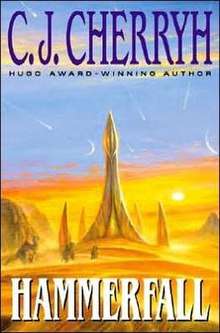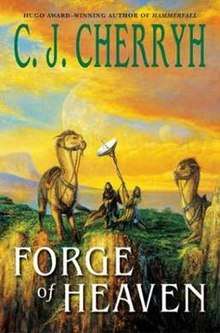The Gene Wars universe
The Gene Wars universe is a fictional universe developed by science fiction and fantasy author C. J. Cherryh. The universe currently consists of two science fiction novels, Hammerfall (2001) and Forge of Heaven (2004). The books were published by HarperCollins under the company's "Eos" imprint. Hammerfall was nominated for the John W. Campbell Memorial Award in 2002.[1]
 Hammerfall cover | |
| Author | C. J. Cherryh |
|---|---|
| Cover artist | Bob Eggleton |
| Country | United States |
| Language | English |
| Genre | Science fiction |
| Publisher | HarperCollins |
Publication date | June 19, 2001 |
| Pages | 390 (hardback) |
| ISBN | 0-06-105260-4 |
| OCLC | 45023270 |
| 813/.54 21 | |
| LC Class | PS3553.H358 H35 2001 |
| Followed by | Forge of Heaven |
 Forge of Heaven cover | |
| Author | C. J. Cherryh |
|---|---|
| Cover artist | Bob Eggleton |
| Country | United States |
| Language | English |
| Genre | Science fiction |
| Publisher | HarperCollins |
Publication date | June 1, 2004 |
| Pages | 416 (hardback) |
| ISBN | 0-380-97903-9 |
| Preceded by | Hammerfall |
The Gene Wars universe contains a human polity in contact with the ondat, an alien race of uncertain shape and incomprehensible ways of thought.
The human polity has been divided against itself in a revolutionary faction called the Movement, which advocated the full exploitation of nanotechnology and gene manipulation, and used those technologies in its fight with the government. As a side effect, one of their technologies infected the ondat, bringing them to war against humanity.
Hammerfall takes place against this background, but it takes quite a while before one discovers the relationship between the larger backdrop and the story of the book.
At the time of Forge of Heaven, the human polity is split into Earth (where gene modification is completely anathema), the Inner Worlds (which emulate Earth) and the Outsiders, who practice limited forms of nanotechnology and gene modification. Contact with the ondat is restricted to one point – Concord Station – and it is here, and on the planet below, Forge of Heaven takes place.
Unlike most of Cherryh's earlier work, Forge of Heaven adapts several themes from postcyberpunk science fiction. The story, for example features postcyberpunk elements such as gene modification, nanotechnology, biotechnology-enabled body modification, and a technologically sophisticated protagonist who acts to uphold the status quo. In addition, the Earthers in the story who dogmatically oppose all transhumanist modifications are portrayed as narrow-minded and paranoid, indicating the book's pro-technology stance as consistent with the conventions of postcyberpunk fiction. Because the work is not set in the near future, however, and features aliens and other tropes of space opera, the book may not qualify as a "pure" example of the postcyberpunk genre.
References
- "2002 Award Winners & Nominees". Worlds Without End. Retrieved 2016-09-14.
Publication information
- Cherryh, C. J. Hammerfall, HarperCollins/Eos, 2001.
- Cherryh, C. J. Forge of Heaven, HarperCollins/Eos, 2004.
External links
- Hammerfall at Worlds Without End